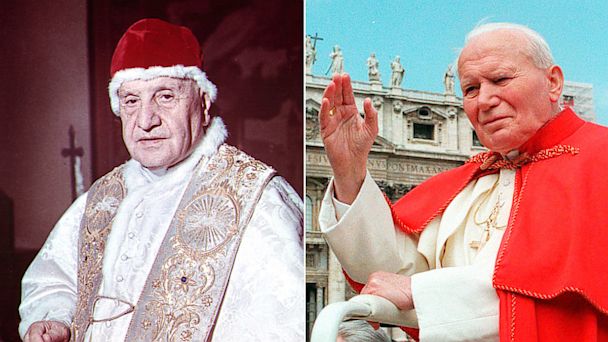5 International Stories You'll Care About This Week

Luigi Felici; Andrew Medichini/AP Photo Caption: Pope John XXIII (left) and Pope John Paul II have been approved for sainthood by the Vatican on July 5, 2013.
This weekend all roads really do lead to Rome. A weekend of firsts - a weekend of four popes! Two will be present - Francis and Benedict. Two will be canonized - John Paul II and John XXIII. More than a million people will flock to the Eternal City for the ceremony in which Francis will raise two of his predecessors to what the church calls "the glory of the altars" - the first time in 2,000 years two popes have been canonized simultaneously. But the weekend is not without controversy. Francis has bent the rules slightly for "the good pope," John, deciding that only one miracle, instead of the customary two, is needed to make him a saint. And while John Paul II is hailed for his role in helping to bring about the fall of communism, critics have questioned his actions as the child abuse scandals began coming into the open. Indeed the idea of "Saint" John Paul is somewhat ironic. As pope, he wanted more "ordinary" saints, encouraging the Vatican's saintmakers to find lay people and even a married couple to canonize. I guess not even future saints are perfect.
In a strange twist, every destination for President Obama on his current Asia trip has been beset by tragedy. After visiting Japan, still recovering from the tsunami, and South Korea reeling from last week's ferry disaster, this weekend Air Force One moves onto the Philippines - rebuilding after Typhoon Haiyan - and Malaysia still searching for missing flight MH370. It will be the first visit to Kuala Lumpur by a US president for nearly 50 years. Others have been regular visitors to Malaysia - most recently China's President Xi, India's Manmohan Sing and Britain's David Cameron. But the last American leader to set foot in Malaysia was Lyndon Johnson in 1966. Back then Malaysia was a model nation that had defeated a communist insurgency and embarked on the road to economic development. Today, Malaysia is beset with political problems. The opposition leader Anwar Ibrahim has been arrested, while the party that has ruled Malaysia since independence lost the popular vote for the first time in elections last year. And overshadowing everything is the fate of that missing Malaysia Airlines plane.
As if Ukraine doesn't have enough problems right now, the tensions between Russia and the government in Kiev are threatening a $2.1 billion construction project to cap the still-leaking Chernobyl nuclear power plant. Tomorrow marks the anniversary of the April 26, 1986 meltdown - the worst nuclear accident the world has ever seen. Chernobyl sits just north of the capital, Kiev. Seven million adults and children were affected. The US, EU and 16 other countries, including Ukraine and Russia, donated hundreds of millions of dollars to stop the leaking reactor. Work on a giant "cap," a huge hanger-like containment shield, began in 2010, after a 13-year delay. The plan was to have it completed by the end of 2015 - and for it to last for the next 100 years. But that plan could be delayed until 2017. The destruction caused by the deadly explosion at Chernobyl was triggered by the release of just 3 percent of the radioactive material in the plant. The rest of the highly unstable nuclear material is still inside the crumbling Chernobyl complex, which experts say remains an enormous "ticking time bomb."
Four weeks after Afghanistan went to the polls, this weekend we should finally know who won - or to be precise, who finished first. In the April 5 poll, 58 percent of Afghanistan turned out to vote. But to "win" any candidate needs to secure more than half the votes cast. Over the past four weeks, the votes have been brought by every form of transport known to man - by road, plane and in some cases by donkey. With more than 82 percent of the votes counted, Afghanistan's former Foreign Minister Abdullah has 44 percent of the vote, while his nearest opponent, Ashraf Ghani, a former professor at Johns Hopkins, is at 33 percent. All the signs are that the election will go to a run-off between the two men to replace Hamid Karzai, who is stepping down after 12 years in power, constitutionally unable to run again. And for all the focus on the south of Afghanistan during the 13-year long war, it's the north that is key to winning the election. With more voters, higher turnout and better security, winning there will unlock the keys to the Presidential Palace.
If you're called O'Brien, there's really only place to be this weekend. A thousand years ago, the grand-daddy of the O'Briens died in Ireland. In fact, all who followed owe their name to Brian Boru - O'Brien literally means "descendent of Brian." And this weekend, the millennium celebrations reach their climax on the Emerald Isle. Boru was the celebrated High King of Ireland. When he took he throne of Thomond (an area which covers much of modern day County Clare) there were around 150 different Kings in Ireland. By 1002, he had attained the title of High King of Ireland, subjugating all the other kings under his rule. In 1014, a group led by the King of Leinster and aided by the Vikings rebelled against Brian's rule. His army won the day but at the cost of Boru's own life. His descendants have played a big role in American life. Some 231 O'Briens took part in the American War for Independence - 700,000 Americans have so far traced their roots back to the original. Many have descended on Armagh where Boru is buried, and where on Sunday, the city's cathedral will commemorate the millennium anniversary.